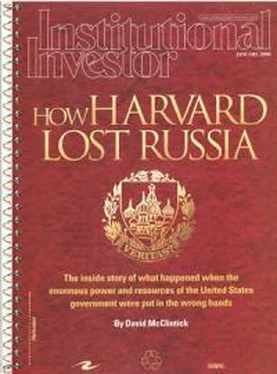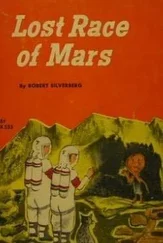To run the Resource Secretariat, Shleifer and Hay reached out to Richard Bernard, who had been active in Moscow as a partner for New Yorkbased law firm Milbank, Tweed, Hadley & McCloy since 1990 and a full-time resident since 1992. Shleifer offered Bernard the position of executive director with a two-year contract. Bernard assumed his responsibilities on January 1, 1995, and promptly hired a second-in-command, Holly Nielsen, a Moscow-based, Russian-speaking partner with the Houston law firm of Baker & Botts.
The RSEC was headquartered on the ninth floor of a high-rise Soviet-era office building on Leninski Prospect. Vasiliev had an office there and another, where he spent most of his time, near Bernard and Nielsen at the Resource Secretariat on Gazetni Street, close to the Kremlin. Hay was at the Legal Reform Project, whose offices were about a mile away on Gasheka Street.
Bernard and Nielsen's first months at the Resource Secretariat were frantic. At first, conditions were primitive -- there were few desks and no photocopiers. Hay, Vasiliev and Sokin were desperate for knowledge and insight. Bernard and Nielsen helped them as best they could while supervising a sprawl of people, activities and contractors that included Arthur Andersen, Price Waterhouse and KPMG, which were advising the government on various securities functions. The Resource Secretariat also worked with a growing community of foreign financial institutions, such as Chase Manhattan Bank and Credit Suisse First Boston, that were eager to gain footholds in what promised to be a burgeoning new market.
Coordinating all of this activity wasn't easy. The top management of the Resource Secretariat and the RSEC, while sharing common purposes, comprised diverse and strong personalities.
Vasiliev, Sokin and Hay had been working together for two years and had bonded. Vasiliev, who declined to be interviewed for this article, was a short, garrulous intellectual who loved political intrigue. He was "knowledgeable, committed and not overwhelmingly mature," Larry Summers would say later. Sokin, the crude, rotund, chain-smoking lawyer with many girlfriends, had been dubbed the "pig in the polyester suit" by one American lawyer. Then there was Hay, the brain-on-overdrive academic with a piercing stare, limited business experience and no time for haircuts. The three were joined at the hip, in Bernard's phrase, spending countless hours together, day and night, sometimes behaving like frat boys. "You're as worthless as a dick on a stump," Sokin liked to banter in Russian to Hay, who found the expression endlessly amusing.
They also recognized each other's strengths: Vasiliev and the more politically savvy Sokin had the ears of Chubais and Orekhov, and, through them, Yeltsin. Hay was their direct pipeline to the millions in U.S. government money that the 1992 Freedom Act had earmarked for Russian reform.
The trio's relationship to Bernard proved problematic. After 16 years counseling the New York Stock Exchange and five years helping craft a Russian securities code, he was "one of the best resources Russia ever had, a brilliant lawyer," says Bruce Lawrence, then one of Credit Suisse First Boston's top men in Moscow. Hay, less than three years out of law school, was very green, yet he was Bernard's titular boss and looked for ways to assert his authority. Bernard tried to be diplomatic, always ready with a smile and a quip, at least to Hay's face. Behind their backs he called Hay and Shleifer "the kids from Harvard."
Hay had gone Russian: He was not only Vasiliev's closest adviser; he socialized, drank and vacationed with Vasiliev and Sokin. Hay "wanted to be buried in the Kremlin Wall," Bernard said in a deposition.
"Jonathan was my boss, at least in the HIID hierarchy," Bernard recalled. "[But] I was his vast superior in substantive knowledge of the business we were in -- much more experienced in business, in management, in leadership. Jonathan struggled with that."
Bernard had an easier time with Vasiliev, who valued his superior knowledge of the markets. Bernard, for his part, appreciated Vasiliev's insight into the Russian politics that had to be navigated en route to the desired reforms. Bernard's coaching helped Vasiliev assert himself as head of the RSEC, which he needed to do in waging a critical political struggle, a war with the Russian Central Bank for control of securities trading.
On one level it resulted from a policy dispute: Should the Russian securities industry develop along U.S. lines, where broker-dealers and investment bankers were the main players in the market, or along German lines, where commercial banks dominated securities trading? Vasiliev and the RSEC, under the influence of American advisers, favored the former approach, while the Central Bank, particularly deputy chairman Andre Kozlov, preferred the latter. A deep personal animosity between Vasiliev and Kozlov fueled the dispute. The RSEC attacked the bank for concealing trading information on and limiting participation in the government securities market. Kozlov told the Wall Street Journal in September 1995 that "Mr. Vasiliev wants to control everybody and anything in the market, and he is angry because he cannot do this totally in the government securities market."
Meantime, Bernard discovered irregularities at the Russia Project. He was tipped off that Russian staffers had created no-show jobs for their relatives and friends in the Institute for Law-Based Economy and that employees were using AID-financed cars and drivers to run personal errands around Moscow. For instance, one top aide to Hay took off three to four hours in the middle of each day to play tennis and used ILBE drivers to convey her. Sokin, too, used office transportation to squire his girlfriends around. Hay had hired one of the girlfriends to make a short documentary about the initial public offering of the Red October candy company, the first IPO in the history of Russia. Bernard also learned that an RSEC contractor was paying reporters at Moscow newspapers to write favorable articles about the commission.
Bernard conveyed his concerns to Hay over coffee at the Starlite Diner, an American-style burger-and-shake joint that had just opened off of Garden Ring Road, a mile from the Kremlin. He told Hay that Sokin was corrupt. Hay scoffed at Bernard's concerns, warning him that he wasn't "with the program."
Subsequently, Hay began to reduce Bernard's responsibilities. Vasiliev told his press attaché, Andrea Rutherford, that Bernard was "too Western and inflexible."
In the summer of 1995, just months into his tenure, in a move orchestrated by Hay, Bernard was called in by Yeltsin's chief legal adviser, Orekhov, and told that he would not be retained in his job. The rationale: A Russian would have more credibility. Shleifer sealed Bernard's firing by phone, breaking his promise of at least a two-year tenure.
Bernard, who returned to the U.S. as executive vice president and general counsel of the NYSE, was succeeded on January 1, 1996, by Dmitri Subbotin, a young, Oxford-educated back-office specialist. Subbotin, though able, smart and hardworking, was inexperienced and later acknowledged that he wasn't qualified to succeed Bernard.
In 1995, Shleifer published Privatizing Russia , in which he and his co-authors, Maxim Boycko, a Russian reformer and chief executive of the Russian Privatization Center, and Robert Vishny, a finance professor at the University of Chicago, claimed credit for the success of economic reform to that point. Summers supplied a blurb for the book, noting that "the authors did remarkable things in Russia."
The problems at Harvard's Russia program, however, were mounting. The number of no-show jobs rose as some of Sokin's girlfriends were put on the payroll, and Sokin himself was given a large AID-funded salary increase and housing allowance, with the funds deposited in a foreign bank account so Sokin could avoid Russian taxes. "[Sokin] is really double-dipping," HIID deputy director Kumins warned Shleifer in a memorandum. "I can't imagine that you will do anything about this, but I believe it is not right all around and does not show good faith on anyone's part." Shleifer ignored the warning.
Читать дальше






![Джонатан Димблби - Barbarossa - How Hitler Lost the War [calibre]](/books/385421/dzhonatan-dimblbi-barbarossa-how-hitler-lost-the-w-thumb.webp)





